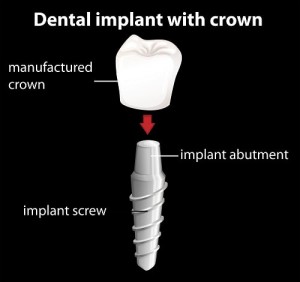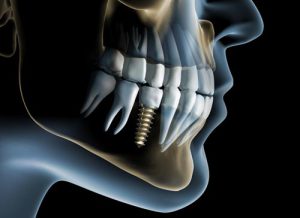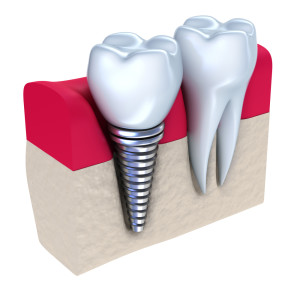Can Dental Implants Really Improve And Repair Your Smile?
Do you have missing or damaged teeth? If so, dental implants offer a wonderful alternative to help restore both your self-esteem and the natural appearance of your smile. To experience the kind of stunning look, feel, and function of dental implants for yourself, we encourage you to give Clarkson North Dental or Dentistry In The Village a call. Alternatively, if you are looking for more information about dental implants, you have come to the right place.
 What Are Dental Implants?
What Are Dental Implants?
Dental implants are made up of three parts: a fixture, an abutment, and a crown. Here is some additional detail about the individual three parts of a dental implant.
- The Fixture: A fixture is an artificial tooth root that is surgically attached to your jawbone. Titanium is used for this piece because it has been shown to be biocompatible with the jawbone which can naturally integrate with the dental implant. This part of the implant is critical because it will support your new tooth once it is fully healed.
- The Abutment: The abutment is the connector piece between the fixture (artificial tooth root) and the crown (replacement tooth). This piece is critical in keeping the replacement tooth firmly in place and providing an invisible piece for the crown to attach to.
- The Crown: The crown is your new, natural-looking replacement tooth and the last piece installed during the dental implant process. Dr. Michael Luciani and Dr. Amanika Luciani will use their years of education and experience to ensure that this piece perfectly blends in with your other teeth.
How Do Dental Implants Differ From Your Natural Teeth?
- Natural teeth and dental implants look very similar, but they are actually different in some very important ways. The most important differences are in the way they attach to the surrounding bone, connecting fibers, and their response to dental disease. Here are some of the differences.
- Natural teeth attach to the bone surrounding them by a small ligament made up of bunches of collagen fibers. Alternatively, dental implants fuse directly to the bone without the need for collagen fibers.
- Gum tissues also attach to the root of a tooth with collagen fibers. However, gum tissues can only stick to the surface of dental implants, so again the collagen fibers are not necessary.
- Teeth are susceptible to decay and may need root canal treatment if the root dies. Dental implants are metal fused to your jawbone. This means they will not decay and they never need root canal therapy.
- Teeth may also be susceptible to periodontal (gum) disease, while dental implants are susceptible to a condition called peri-implantitis. If patients experience this response, it is usually an inflammatory problem that impacts the tissues surrounding the implant. If left untreated, peri-implantitis can cause disintegration of the bone that holds the implant and ultimately dental implant failure.
Preparing For Dental Implant Surgery
Preparing for your procedure is almost as important as the procedure itself. That is why it is critical that you tell your doctor about any medical conditions, medications you take, or any additional health concerns you may have. Another recommendation is that you get your mouth as healthy as possible by practicing excellent oral hygiene, stop your smoking habit, and getting any signs of gum disease well under control. If you have additional questions about preparing for dental implant placement, please give us a call.
 The Dental Implant Placement Process
The Dental Implant Placement Process
Stage 1: The Consultation
The dental implant process is relatively simple and starts with a call to our office to schedule a consultation. Next, we will inspect your mouth and jaw. After you and your doctor agree on the best treatment plan for your mouth and smile, you will schedule a pre-surgical appointment where necessary X-rays, and models of your teeth will be taken, then a surgical appointment will be arranged to begin the dental implant procedure.
Stage 2: Placing The Implant Fixture
Once your measurements have been taken and all questions have been answered, your doctor will start the installation of the dental implant (root). This simple oral surgery begins with your doctor making a small incision along the gum line. Local anesthesia is administered prior to this time to prevent any discomfort. Then, the artificial tooth root is inserted directly into your jawbone. Once this part is complete, you will be sent home to heal. It is critical that you avoid chewing on the implant site and keep it clean during this phase.
Stage 3: Attaching The Abutment Piece
After the root of the implant has been properly placed and has healed for 2-6 months, you will return to have your abutment attached to your implant fixture. An abutment is the piece of the dental implant connecting the artificial root or fixture to the crown (your new artificial tooth). This step also begins the process of creating your artificial tooth. Our doctors take special pride in matching your prosthesis precisely so that it looks and feels just like your other teeth.
Stage 4: Connecting The Crown
After we are satisfied that your artificial tooth perfectly matches your other teeth, one of our skilled doctors will place your crown onto the abutment and your new smile will be beautiful for many years to come!
Common Traits Of Successful Dental Implant Candidates
- You are missing one or more teeth. A whole row of teeth can also be replaced.
- You have healthy gums and bone in your jaw. Healthy tissue better allows the implant to heal properly and stay firmly attached to the jawbone after the placement procedure.
- You have good overall health. This ensures fewer problems after the placement procedure.
- You have good oral hygiene habits or are willing to start. A clean and healthy mouth ensures better healing and fewer complications after the surgery.
- You are willing and able to follow the doctor’s instructions after surgery, as well as to commit the necessary 3 – 6 months to the procedure.
Candidates Who May Not Qualify For Dental Implants
- Women who are pregnant. These patients are not preferred because dental implant placement involves surgery and it is recommended that women who are pregnant avoid elective surgery, as well as anesthesia.
- Uncontrolled tooth grinders or clenchers. These patients could end up displacing the dental implant, or at the very least damaging the critical healing that occurs when patients avoid putting any pressure on the implant site.
- Children under the age of 18 who have undeveloped bone growth in the jaw. These patients are less preferred because continued growth of the jaw could displace the implant root or change the final position of the implant crown.
- Patients with serious underlying health conditions or those who are undergoing cancer treatment. These patients are not preferred because they could have trouble healing after the procedure during the important healing phase.
- Smokers. These patients are generally less preferred because of problems with healing, circulation and bone growth.
- Patients with uncontrolled gum disease. These patients will need to get their gum disease well under control before having implant surgery.
What If I Am Not A Good Candidate?
The most important thing you can do to help yourself is to become as healthy as possible prior to any surgical procedures. Supplemental procedures may be needed to improve inadequate bone and tissue in the mouth and jaw areas. Quitting smoking is also helpful. Please feel free to contact our helpful office staff at Clarkson North Dental or Dentistry In The Village in Mississauga to discuss how you can be better prepared for dental implants.
Supplemental Procedures For Dental Implants
Most of our patients want to get started with dental implant placement as soon as possible. However, some of these patients may not be able to proceed right away because of issues with receding gum tissues or jawbone thickness or density. Here at Clarkson North Dental and Dentistry In The Village we offer many exceptional supplemental procedures that can help prepare our patients for their treatment. Read on to discover some additional details about problems that can prevent dental implant placement and about the supplemental treatments that were designed to fix these issues.
Gum Tissue Augmentation
Gum tissue augmentation requires that a small tissue graft be harvested from the patient’s palate using a small incision or the use of tissue from a tissue donor. This can be done before placing the dental implants, or at the same time they are being placed. The specially harvested graft material will then be placed in the prepared site where gums have receded. The resulting tissue graft preserves the necessary soft tissue, gives a more natural look, and makes the gums less likely to recede after dental implant surgery.
Bone Grafting
The primary way doctors strengthen a weakened jawbone is with bone grafting. This simple procedure can be performed in your doctor’s office before or at the same time as dental implant placement. During the procedure itself, a small incision is made and a little piece or particles of donated bone is attached to the area lacking volume. As the area heals, the donated bone fuses with patient’s own bone and the area is better prepared to support dental implants.
Leukocyte – Platelet Rich Fibrin (L-PRF): Regenerative Medicine.
Leukocyte-Platelet Rich Fibrin (L-PRF) has been shown to significantly enhance the post-operative healing from dental surgery. L-PRF is a component of a patient’s own blood which contains platelets, growth factors, and stem cells that help stimulate soft tissue and bone healing, while decreasing post-operative complications and infections. The patient’s own blood is collected and placed a centrifuge to concentrate the platelets and white blood cells. The centrifuge will activate the platelets causing them to release growth factors.
The L-PRF procedure was invented by Joseph Choukroun, MD of France in 2001 to treat large non-healing ulcers. You can view a detailed medical lecture on PRF online at: https://intra-lock.com/why-l-prf-for-patients.html
 Dental Implant Benefits
Dental Implant Benefits
- Dental implants are a more permanent solution to tooth loss.
- Dental implants look like natural teeth.
- Dental implants function similar to real teeth.
- This treatment is the only one that can eliminate jawbone deterioration, so jaw muscles can stay strong, supple, and functional.
- No extra care is necessary since implants can be maintained with daily brushing, flossing, and regular dental cleanings and exams.
Drawbacks
- This option is considered an elective procedure so it is not usually covered by dental insurance, but more plans are allowing insurance funds to be used toward a portion of the implant.
- The process can also be long compared to the ease of other options that are done in just weeks.
- Dental implants require multiple visits over the course of 3 – 6 months and supplementary procedures like bone grafts and tissue augmentation may be required for some patients.
- This option is the most expensive of tooth replacement options initially. However, in the long run, if you consider the added expenses of replacing other options every 5-10 years, dental implants are reasonably priced.